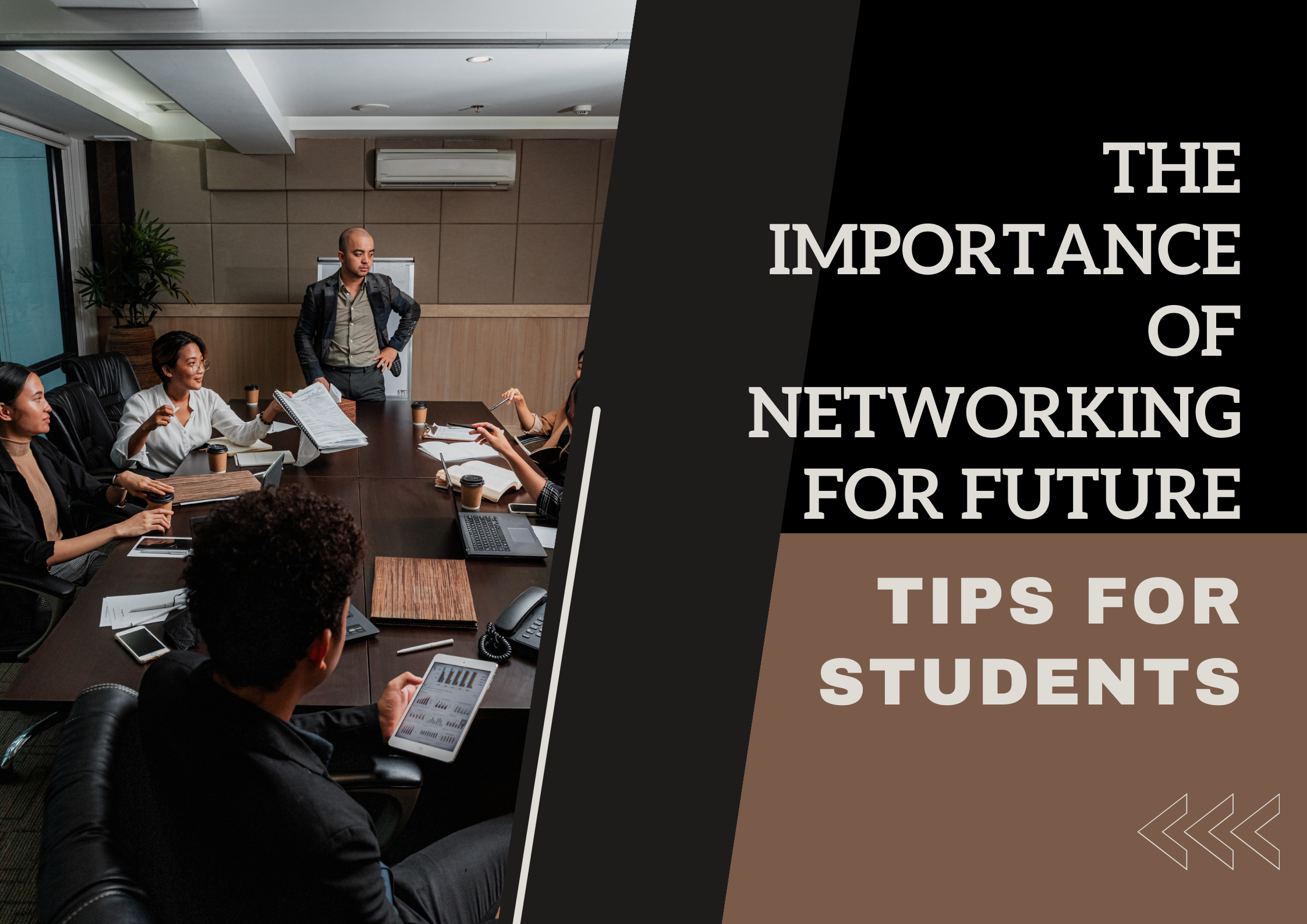Networking is a dynamic and multifaceted process involving creating and nurturing professional relationships with individuals.
It goes beyond mere socializing and encompasses intentional efforts to build connections that can contribute to personal and career development.
Networking is not solely about exchanging business cards or connecting on professional platforms; it is about forging genuine relationships that can provide mutual benefits over time.
This introduction aims to lay the groundwork for understanding the nuanced and crucial role that networking plays in shaping future career success.
Significance of Networking for Career Development
The importance of networking in career development cannot be overstated. In a competitive job market, where qualifications and skills are often comparable, personal connections can be the differentiating factor.
Networking opens doors to job opportunities, provides access to valuable industry insights, and fosters mentorship, all of which are instrumental in achieving and sustaining career success.
Purpose of the Paper
This paper aims to explore the importance of networking for students and offer practical tips to enhance their networking skills.
By delving into the components of importance of networking, understanding its impact on career success, and providing actionable strategies, this paper aims to equip students with the knowledge and tools necessary to navigate the professional landscape and build meaningful connections that will serve them well in their future careers.
Understanding Networking

Definition and Components of Networking
Networking is not a one-size-fits-all concept; it encompasses a range of activities and approaches. It involves both in-person and online interactions, from attending industry events to engaging on professional platforms like LinkedIn.
Understanding the diverse components of networking allows students to tailor their approach to their strengths and preferences.
Networking involves meeting new people and maintaining and leveraging existing relationships. Connecting authentically, communicating effectively, and building a network beyond immediate circles is crucial for long-term success, and understanding the importance of networking is vital.
Types of Networking
Networking takes various forms, each serving a distinct purpose in career development. Professional networking involves connecting with individuals in one’s industry or field, often for career-related purposes.
Social networking expands the scope to include a broader range of personal and professional connections, while online networking leverages digital platforms to facilitate connections and information-sharing.
Recognizing the different types of networking allows students to adopt a holistic approach that integrates various strategies to suit different contexts and objectives, and understanding the importance of networking is vital.
Building and Nurturing Professional Relationships
Building professional relationships is a continuous process that extends beyond initial introductions.
It involves cultivating genuine connections, demonstrating reliability, and adding value to others. Nurturing relationships requires active engagement, effective communication, and a mindset focused on mutual benefit.
Emphasizing the importance of both breadth and depth in professional relationships, students can learn to navigate the delicate balance of building a diverse network while also fostering meaningful connections that can withstand the test of time.
The Impact of Networking on Career Success
Job Opportunities and Career Advancement
Networking is a gateway to job opportunities that may not be publicly advertised. Many positions are filled through referrals and recommendations, making personal connections a valuable asset in the job search process.
Furthermore, as individuals progress in their careers, understanding the importance of networking plays a pivotal role in securing promotions and advancement opportunities.
Understanding how the importance of networking directly influences career progression motivates students to invest time and effort into cultivating and expanding their professional networks.
Access to Industry Insights and Information
Beyond job opportunities, networking provides access to valuable industry insights and information. By connecting with seasoned professionals, students can gain a deeper understanding of industry trends, emerging technologies, and skills in demand.
This knowledge not only enhances their marketability but also positions them as informed and proactive contributors in their chosen fields.
Networking facilitates the exchange of knowledge, creating a symbiotic relationship where individuals can share their expertise and learn from one another, contributing to continuous professional growth.
Mentorship and Professional Guidance
One of the most significant benefits of effective networking is the potential for mentorship. Seasoned professionals, through networking connections, can provide guidance, share experiences, and offer valuable advice to students navigating the early stages of their careers.
Mentorship relationships contribute to personal and professional development and a sense of community and support.
Encouraging students to seek mentorship through networking actively fosters a culture of learning and collaboration, creating a bridge between experienced professionals and those entering the workforce.
Networking Strategies for Students
Building a Strong Online Presence
LinkedIn and Other Professional Platforms
Establishing a strong online presence, particularly on platforms like LinkedIn, is a foundational step in modern networking. Students should create and optimize their profiles, highlighting their skills, experiences, and aspirations.
A well-crafted LinkedIn profile serves as a digital resume and a tool for connecting with professionals in their field.
Encouraging students to regularly update their profiles, engage in industry-related discussions, and showcase their achievements enhances their visibility and attractiveness to potential connections.
Creating an Impressive Online Profile
Beyond professional platforms, students should be mindful of their online presence across various channels. Social media profiles, personal websites, and other digital platforms contribute to the overall impression potential connections may have.
Teaching students to curate a professional online image ensures that their digital footprint aligns with their career goals.
Attending Networking Events
Career Fairs
Career fairs provide students with direct access to recruiters and industry professionals. Attending these events allows students to make face-to-face connections, inquire about job opportunities, and gain insights into different organizations.
Preparing for career fairs involves researching participating companies, practicing elevator pitches, and dressing professionally.
Industry Conferences and Seminars
Industry conferences and seminars allow students to immerse themselves in their chosen field. These events feature expert speakers, workshops, and networking opportunities.
Encouraging students to attend such gatherings exposes them to current industry trends and facilitates connections with like-minded professionals.
Informational Interviews and Shadowing
Informational interviews and job shadowing experiences provide students with a firsthand understanding of specific roles and industries.
These interactions go beyond formal networking events and allow students to build rapport with professionals in a more relaxed setting. Students should be encouraged to approach these opportunities with genuine curiosity and a willingness to learn.
Joining Professional Organizations and Clubs
Participating in professional organizations and clubs related to their field of study amplifies students’ networking opportunities.
These groups provide a structured platform for networking events, workshops, and mentorship programs. Joining such organizations exposes students to a broader network of professionals who share similar interests and goals.
Networking Strategies for Students
Introversion and Shyness
Networking can be particularly challenging for introverted individuals or those who are naturally shy. Recognizing and normalizing these challenges is crucial.
Students should be encouraged to embrace their authentic selves and explore networking approaches that align with their personalities. This might involve starting with smaller, more intimate networking events or practicing networking skills in a supportive environment.
Fear of Rejection
The fear of rejection is a common barrier to networking. Students should understand that rejection is a natural part of the process and not a reflection of their worth.
Developing resilience and a positive mindset in the face of rejection is key to persevering in networking efforts. Encouraging students to view rejection as an opportunity for growth and learning fosters a healthier approach to the networking journey.
Building Authentic Connections
Authenticity is at the core of effective networking. Encouraging students to be genuine in their interactions, share their unique perspectives, and actively listen to others contributes to the development of authentic connections.
Highlighting the value of building relationships based on mutual respect and shared interests rather than transactional motives fosters a more meaningful and sustainable network.
Utilizing Academic Resources for Networking
Engaging with Career Services
Career services within educational institutions are valuable resources that often go underutilized. These services offer guidance on resume building, interview preparation, and networking strategies.
Encouraging students to engage with career services actively equips them with the tools and knowledge necessary to navigate the professional landscape successfully.
Networking Opportunities within Educational Institutions
Networking opportunities abound within educational institutions. From alumni events to industry-specific workshops, students can leverage these events to connect with professionals in their field of interest.
Recognizing and participating in these opportunities allows students to build a foundation for networking before entering the broader professional arena.
Alumni Networks and Connections
Alumni networks provide a powerful platform for networking. Alumni often feel a sense of camaraderie with current students and are willing to offer guidance and support.
Students should be encouraged to explore and actively participate in alumni networks, attend events, and reach out to alumni for informational interviews or mentorship.
Networking Etiquette and Best Practices
Effective Communication Skills
Effective communication is a cornerstone of successful networking. Students should be coached on how to craft concise and compelling introductions, commonly known as elevator pitches.
Additionally, they should develop active listening skills, ask thoughtful questions, and express gratitude when receiving assistance or guidance.
Following Up and Maintaining Relationships
The importance of following up after initial interactions cannot be overstated. Encouraging students to send personalized thank-you emails, connect on professional platforms, and express their continued interest in maintaining the relationship ensures that initial connections evolve into meaningful, long-term associations. Maintaining relationships involves periodic check-ins, sharing relevant information, and reciprocating support.
Giving and Receiving Constructive Feedback
Networking is a reciprocal process. Students should understand the value of giving as well as receiving. Offering assistance, sharing relevant resources, and providing constructive feedback contribute to a positive networking dynamic. Encouraging students to approach networking as a collaborative endeavor fosters a culture of support and mutual growth.
Case Studies and Success Stories
Real-life Examples of Successful Networking
Sharing real-life case studies and success stories provides tangible examples of how effective networking has contributed to career success.
These narratives should highlight diverse paths to success, showcasing individuals who have leveraged networking to secure job opportunities, gain mentorship, or navigate career transitions.
How Networking Contributed to Career Growth
Exploring the specific ways in which networking has contributed to the career growth of individuals adds depth to the discussion. Success stories can illustrate the importance of networking on securing promotions, transitioning between industries, and achieving long-term career goals.
Testimonials from Professionals in Various Fields
Testimonials from professionals across different fields provide students with insights into the varied ways networking has played a role in their careers.
These testimonials can emphasize the importance of networking not only in securing job opportunities but also in creating a fulfilling and dynamic professional journey.
The Role of Networking in Different Industries

Networking in Technology and Start-ups
Networking plays a unique role in the technology and start-up industries. Students interested in these fields should be aware of the importance of attending tech conferences, participating in hackathons, and engaging with industry leaders on digital platforms.
Networking in these industries often involves showcasing skills through collaborative projects contributing to open-source communities and understanding the importance of networking.
Networking in Healthcare and Medicine
In healthcare and medicine, networking can extend beyond traditional professional circles. Students pursuing careers in healthcare should be encouraged to attend medical conferences, engage with professionals in research initiatives, and explore opportunities for interdisciplinary networking. Establishing connections with mentors and experienced practitioners is particularly valuable in this field.
Networking in Creative Industries
Creative industries, including art, design, and entertainment, often rely on personal connections and collaborations. Students in these fields should explore the importance of networking opportunities at art exhibitions, design events, and film festivals.
Building relationships with professionals and peers within the creative community can open doors to collaboration and exposure.
Future Trends in Networking
Impact of Technology on Networking
Technology continues to shape the landscape of networking. The advent of virtual reality (VR) and augmented reality (AR) can redefine how professionals connect and collaborate.
Students should be aware of emerging technologies that may influence the future of networking, be prepared to adapt their strategies accordingly and understand the importance of networking.
Virtual Networking and Remote Work
The rise of remote work has given prominence to virtual networking. Students should be equipped with the skills to navigate virtual platforms, engage in online discussions, and leverage digital tools for effective networking.
Understanding the dynamics of remote networking prepares students for the evolving nature of work and professional relationships.
Evolving Trends in Professional Relationship Building
As industries evolve, so do the trends in professional relationship building. Students should stay informed about changing expectations and norms within their chosen fields.
Whether it’s the increasing importance of personal branding or the shift towards more informal networking events, staying attuned to these trends ensures students can adapt their strategies for continued success.
Conclusion
Recap of Key Points
In summarizing the key points discussed throughout the paper, the conclusion reinforces the central role of networking in future career success. It revisits the importance of building authentic connections, leveraging in-person and online opportunities, and continuously nurturing professional relationships.
Encouragement for Students to Start Networking Early
Emphasizing the value of starting the networking journey early in one’s academic career, the conclusion encourages students to engage in networking activities proactively.
By instilling the mindset that networking is a gradual and ongoing process, students can overcome initial hesitations and recognize the long-term benefits of investing in their professional connections.
Call to Action for Building and Expanding Professional Networks
The conclusion concludes with a compelling call to action for students to take charge of their networking destiny. It encourages them to apply the tips and strategies provided throughout the paper, seek out opportunities within their academic and professional communities, and be proactive in building and expanding their professional networks.













.jpg)



